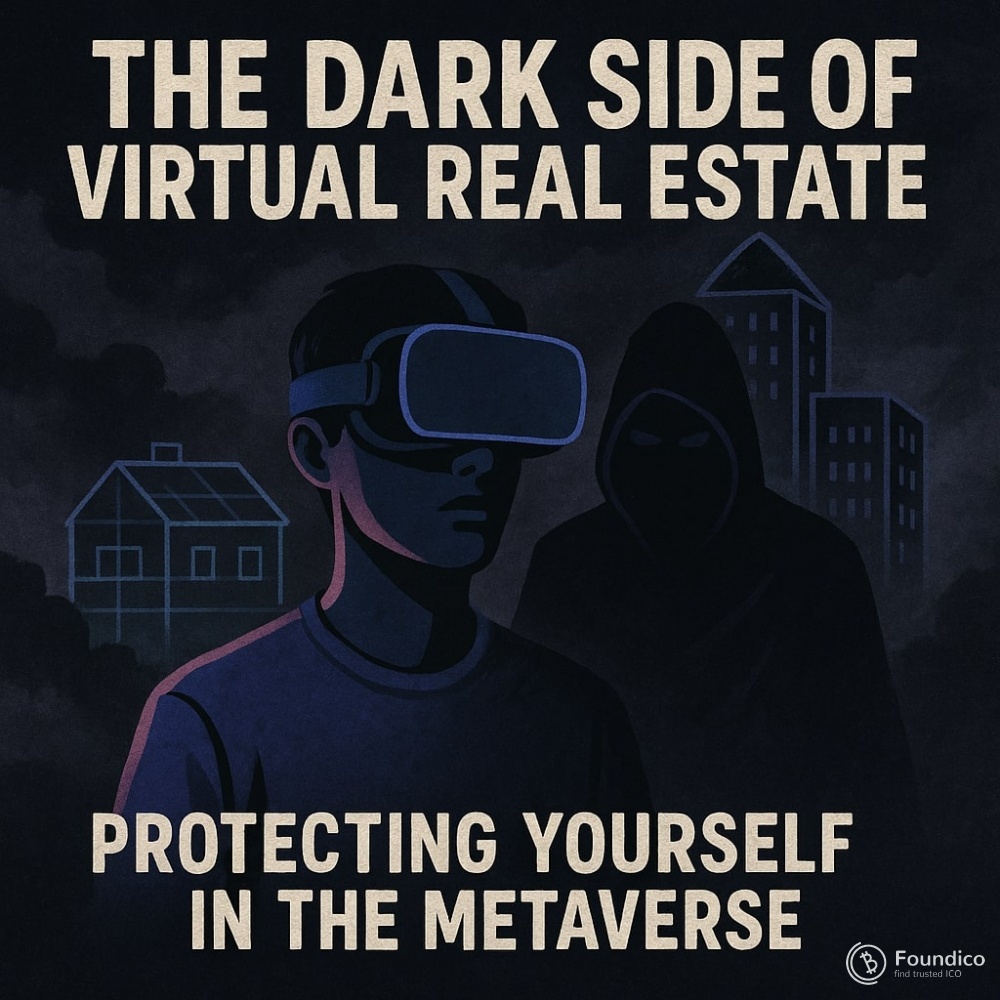The Dark Side of Virtual Real Estate: Protecting Yourself in the Metaverse

By Dr. Pooyan Ghamari, Swiss Economist and Visionary
The emergence of the metaverse—a vast, immersive digital universe—has sparked a new wave of interest in virtual real estate. From bustling virtual cities to exclusive digital estates, owning property in the metaverse is no longer a futuristic concept but a present-day reality attracting investors, entrepreneurs, and enthusiasts worldwide. However, alongside the exciting opportunities lies a shadowy underside filled with risks, scams, and threats that can jeopardize your digital assets and personal security.
In this article, we explore the darker aspects of virtual real estate and provide guidance on how you can safeguard yourself while navigating the metaverse.
The Allure and Risks of Virtual Real Estate
Virtual real estate represents parcels of digital land or property within metaverse platforms such as Decentraland, The Sandbox, Cryptovoxels, and others. Ownership is typically recorded via blockchain technology using NFTs (non-fungible tokens), which prove authenticity and scarcity. Buyers envision using virtual land for social gatherings, commerce, art galleries, and even entertainment venues.
Yet, the rapid growth and relatively unregulated nature of this market have exposed participants to a variety of threats:
-
Fraudulent Sales and Fake Listings: Sellers may advertise properties they do not own or that don’t exist within the platform.
-
Phishing and Wallet Hacks: Cybercriminals target users’ digital wallets to steal valuable NFTs and cryptocurrencies.
-
Market Manipulation: Coordinated schemes artificially inflate property prices to lure investors into overpriced purchases.
-
Legal and Regulatory Uncertainties: Ownership rights and dispute resolution in virtual spaces remain complex and ambiguous.
-
Privacy Concerns: Interaction within the metaverse may expose users to data harvesting or identity theft.
Understanding the Dark Side: Common Threats in Virtual Real Estate
1. Scams and Deception
Many newcomers to virtual real estate fall victim to scams ranging from fake platform impersonations to fraudulent brokers. Some scams involve selling parcels of virtual land multiple times to different buyers—a digital form of the classic “double selling” fraud.
2. Security Breaches
Because virtual property ownership depends on digital wallets, the security of these wallets is paramount. Phishing emails, malware, or compromised devices can allow attackers to steal access credentials, emptying wallets and causing permanent loss of assets.
3. Market Volatility and Manipulation
The speculative nature of virtual real estate means prices can be highly volatile. Coordinated “pump-and-dump” schemes exploit hype and misinformation, leaving unwary investors with worthless digital parcels.
4. Lack of Legal Protections
Traditional real estate benefits from robust legal frameworks. In contrast, virtual land operates in a largely unregulated environment where disputes over ownership or fraud can be difficult to resolve.
5. Privacy and Identity Risks
The immersive social nature of the metaverse means users share personal data and behavioral information. Without proper safeguards, this data can be harvested or misused by malicious actors.
How to Protect Yourself in the Metaverse
1. Choose Reputable Platforms
Only buy virtual land from well-established platforms with transparent operations, active communities, and verified marketplaces. Research the platform’s history and user feedback.
2. Secure Your Digital Wallet
Use hardware wallets where possible, enable two-factor authentication, and never share private keys. Be extremely cautious with links and messages requesting wallet information.
3. Verify Ownership and Transactions
Before buying, verify the NFT’s authenticity on the blockchain. Use trusted blockchain explorers to confirm ownership and transaction history.
4. Be Wary of Unrealistic Promises
Avoid offers guaranteeing high returns or urgent purchase opportunities. Scammers thrive on creating a sense of urgency to rush decisions.
5. Engage with the Community
Participate in forums, social media groups, and official platform channels to stay informed about scams and best practices.
6. Consult Legal and Technical Experts
For significant investments, consider legal advice on digital property rights and technical audits of security measures.
The Future of Virtual Real Estate Security
As the metaverse grows, industry stakeholders are developing standards and technologies to improve trust and security. These include:
-
Decentralized Identity Systems to protect privacy and verify users.
-
Smart Contract Enhancements to automate transparent, tamper-proof transactions.
-
Regulatory Frameworks aimed at consumer protection and dispute resolution.
Final Reflections by Dr. Pooyan Ghamari
The digital revolution embodied by the metaverse offers extraordinary opportunities but also challenges our traditional understanding of ownership, security, and trust. As a Swiss economist observing these trends, I stress that while virtual real estate can be rewarding, it demands a vigilant and informed approach.
Protecting yourself against the dark side of virtual real estate means combining technological caution with continuous education. Your digital assets deserve the same level of care and scrutiny as your physical investments.
By embracing best practices and staying alert to emerging threats, you can confidently explore and thrive in the metaverse’s promising but complex landscape.

 BitcoinHyper - Bitcoin Hyper finally unlocks fast and cheap Bitcoin transactions by delivering the first ever Bitcoin Layer 2 blockchain.
BitcoinHyper - Bitcoin Hyper finally unlocks fast and cheap Bitcoin transactions by delivering the first ever Bitcoin Layer 2 blockchain.